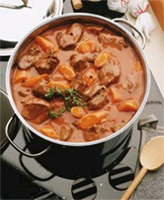
In a September post, I suggested people were welcome to send me their favorite chulent recipes. I wished to post them altogether and then link to kcc (the Kosher Cooking Carnival) so that they would be included in the next edition. A few people have answered; I’ll post their recipes tomorrow along with a few links.
But first a few explanations about chulent, also spelled cholent.
Etymology:
Max Weinreich traces the etymology of cholent to the Latin present participle calentem, meaning “that which is hot” (as in calorie), via Old French chalant (present participle of chalt, from the verb chaloir, “to warm”). One widely quoted folk etymology, relying on the French pronunciation of cholent or the Central and Western European variants shalent or shalet, derives the word from French chaud (“hot”) and lent (“slow”), but it is categorically rejected by professional linguists. Another folk etymology derives cholent (or sholen) from the Hebrew she’lan, which means “that rested [overnight]”. This refers to the old time cooking process of Jewish families placing their individual pots of cholent into the town baker’s ovens that always stayed hot and slow-cooked the food overnight. (Wikipedia)
This is what the dictionary says:
a Jewish Sabbath dish of slowly baked meat and vegetables, prepared on a Friday and cooked overnight.
About.com has a a longer definition:
Cholent is the quintessential Jewish food. Jewish law prohits lighting a fire and cooking on the Sabbath. So how can an observant Jewish family eat a hot, nourishing meal on the Sabbath? Cholent, a slow-cooked, bean-barley stew, has been the answer for centuries. Legumes are not only suited for slow cooking and nutritious, they are also economical.
If you have time, you can read a longer and more personal article by G. Erdosh on jewishmag.com.

Did you get any recipes for dafina? That’s the Moroccan version of chulent.
Leora: As you’ll see I only got 3 recipes and a link to a link to a post by MiI. Unfortunately I got no recipes for dafina. I have eaten it once on a very cold February Shabbat.